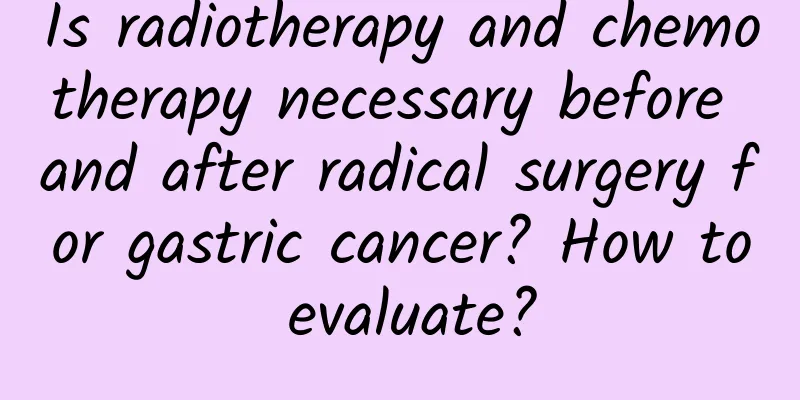Is radiotherapy and chemotherapy necessary before and after radical surgery for gastric cancer? How to evaluate?

|
Author: Liang Bin, Chief Physician, Peking University People's Hospital Reviewer: Yu Yanyan, Chief Physician, Peking University First Hospital The mainstream surgical method for gastric cancer is radical surgery. Depending on the location and size of the tumor, partial gastrectomy or total gastrectomy, including peripheral lymph node dissection, can be performed. The standard for radical surgery is that no residual lesions can be seen under the naked eye or microscope. Radical surgery can be performed for early gastric cancer or locally advanced gastric cancer without distant metastasis. Before radical surgery for gastric cancer, first of all, oncological evaluation, histopathological diagnosis, and imaging examination for staging are required; secondly, the patient's physical tolerance should be evaluated, including cardiopulmonary function, liver and kidney function, etc., to determine whether the patient can tolerate radical surgery. In addition, it is also necessary to evaluate whether radiotherapy and chemotherapy are needed before and after radical surgery. Early-stage gastric cancer generally does not require preoperative radiotherapy or chemotherapy. For digestive tract tumors, radiotherapy is a very effective treatment in some cases. If the target area of radiotherapy moves, the effect of radiotherapy will be affected, and other organs may be irradiated, and side effects or damage will be relatively increased. Therefore, the target organ or target site of radiotherapy must be relatively fixed in order to achieve relatively good results. For example, proximal gastric cancer, or gastric cancer near the cardia, is relatively fixed in position and is located at the junction of the stomach and esophagus. For advanced proximal gastric cancer, if surgery cannot guarantee a radical effect, a treatment strategy combining preoperative radiotherapy and chemotherapy can be considered. At present, most people believe that if the gastric cancer stage is within the T3+N+ stage range, preoperative neoadjuvant chemotherapy is recommended. Clinical studies have shown that the overall survival of these patients has improved after neoadjuvant chemotherapy. Preoperative neoadjuvant chemotherapy can, first of all, remove some tiny metastatic lesions, because some tiny metastatic lesions cannot be seen in imaging; secondly, chemotherapy can downgrade the stage of the disease. For example, if the disease was originally in stage T3N3, it may be downgraded to stage T2N2 after chemotherapy, which will reduce the difficulty of surgery and may improve the long-term effect; thirdly, chemotherapy can help us understand which chemotherapy drugs the patient is more sensitive to; fourthly, the patient's digestive tract anatomy is normal before surgery, and his tolerance to chemotherapy is better than that after surgery, and the side effects are also smaller than after surgery. Figure 1 Original copyright image, no permission to reprint Generally, 4-6 courses of chemotherapy are required before radical surgery for gastric cancer. Clinical studies have shown that with such a long chemotherapy, the overall clinical response of patients is relatively good. Domestic studies have shown that the tumor control rate is basically between 60% and 80%, which means that most patients do not show any progression. If more chemotherapy courses are added, a greater downstaging effect cannot be achieved, the patient's tolerance will decrease, and the tolerance to surgery will also become relatively worse, and a better treatment effect cannot be achieved. Regular evaluation is required during the preoperative neoadjuvant chemotherapy period. Generally, an imaging evaluation is performed after 2-3 courses of chemotherapy. Based on the response of the lesion site, it is determined whether the chemotherapy regimen needs to be revised. With conventional chemotherapy drugs, surgery can generally be performed 2 weeks after the end of chemotherapy. The definition of radical surgery is that there is no tumor residue visible to the naked eye or under the microscope. However, it is currently impossible to detect whether there are tiny hidden tumor cells in the body. After radical surgery, the tissue specimens removed must be pathologically staged. If the pathological examination indicates early gastric cancer and there is no lymph node metastasis, postoperative adjuvant chemotherapy may not be performed. If the tumor is in the advanced stage, especially in patients with lymph node metastasis, the possibility of residual occult micro-tumor lesions after surgery will increase. For this reason, postoperative adjuvant chemotherapy is used to eliminate tumor cells that may be free in various parts of the body. Clinical studies have shown that for advanced gastric cancer, postoperative chemotherapy can significantly improve the patient's 5-year survival rate. Figure 2 Original copyright image, no permission to reprint If the patient has not received chemotherapy before surgery, and postoperative pathological evaluation shows that adjuvant chemotherapy is needed, 6-8 courses of treatment are usually required, with each course lasting 21 days. If the patient has received neoadjuvant chemotherapy before surgery and the chemotherapy effect is significant, but there is still residual tumor after surgery, chemotherapy may need to continue according to the original plan until about 8 courses of chemotherapy are completed. If there are no tumor cells remaining in the resected specimen, subsequent adjuvant chemotherapy can be discontinued, or 4 more courses of consolidation can be performed according to the preoperative chemotherapy plan. If the preoperative chemotherapy is not effective, the chemotherapy plan needs to be changed, and the treatment should be carried out according to the course specified in the new plan. |
<<: Hemodialysis patients: protection of native arteriovenous fistula!
Recommend
Why do I have breast pain before my period?
Every woman has a menstrual period every month, w...
Why do women urinate frequently and cannot urinate completely at night?
Nowadays, office workers are under increasing wor...
What should I pay attention to during the second caesarean section?
With our government's continuous reform and a...
No yolk sac at 6 weeks of pregnancy
Generally, when we go to the hospital for an ultr...
What are the symptoms of bad uterus on the face?
The uterus is the representative of women and is ...
Will donkey hide gelatin affect menstruation?
Donkey-hide gelatin is a very famous medicinal he...
The secret to healthy running: How to take every right step?
Review expert: Peng Guoqiu, deputy chief physicia...
Why is the woman's eyelid swollen?
Many women find that their eyelids seem uncomfort...
What are the three types of breast fibroids?
The mammary gland is the glandular tissue inside ...
What is the reason for the blackheads in frozen shrimp? Can the blackheads in frozen shrimp still be eaten?
Ice shrimp, also known as Arctic shrimp, is a kin...
Low thyroid stimulating hormone in women
Thyroid-stimulating hormone is a hormone secreted...
Is 25mm still considered a high-quality follicle?
Most of the infertility symptoms in women of chil...
Reasons for bleeding after menstruation
Bleeding after menstruation may be caused by the ...
How to apply for an epidemic vehicle pass? Application form template for an epidemic vehicle pass
During the epidemic, vehicles are not allowed to ...
Can I have abortion at 32 days of pregnancy?
Nowadays, many couples want to live a life togeth...









